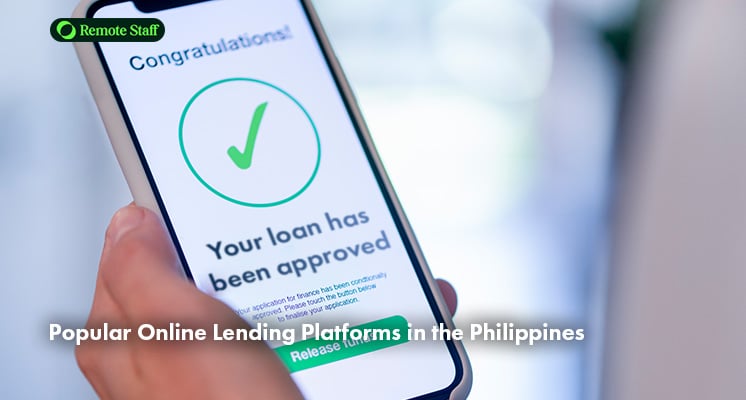When I was younger, I used to have a very negative view of taking debts and loans after seeing my parents struggle to pay them off. I even swore to never apply for a credit card, out of fear of misusing it.
However, as I grew up, I realized that relying solely on your traditional or online jobs isn’t enough.
Enter the various loan facilities in the country. These include traditional bank loans, government loans (Pag-IBIG and SSS loans), and pawnshop loans.
Besides these, there’s also the growing popularity of online lending platforms that enable you to get loans quickly – anytime, anywhere.
When used right, these financial tools can help you achieve your goals faster.
So, what types of loans can you avail from banks and online lending platforms? Also, how do you apply for them? Let’s find out.
Disclaimer: This article is no substitute for professional financial advice, and readers are advised to do their due diligence before availing the services mentioned below.
Why Are Young Professionals Exploring Loans More Than Ever?
One of the main reasons so many young professionals (yuppies) and couples are taking various types of loans is due to the rising costs of living today.
Unless they have multiple cyber jobs or side gigs, many yuppies struggle to keep up with the ever-escalating prices of daily necessities, housing, and healthcare.
Aside from basic necessities, many yuppies are also looking to invest or start their own businesses, thus the need for a business loan.
In addition, despite the prevalence of remote work opportunities, many yuppies still apply for auto loans so they can afford a car for personal or business use.
Yuppies also take on loans to fund significant life events and milestones like weddings or travelling to their dream destinations.
Finally, many yuppies are also investing in post-graduate studies to help advance their careers, which requires additional funding in the form of student loans.

Popular Online Lending Platforms in the Philippines
First off, let’s begin by taking a look at the most commonly used, legitimate online lending platforms in the country today:
1. Personal Cash Loans (Short-Term or Emergency Loans)
These platforms are ideal for short-term or emergency needs:
JuanHand
- A fully online, SEC (Securities and Exchange Commission)-licensed fintech (financial technology) app powered by AI to deliver loans quickly without requiring collateral or income proof.
- Loan Amount: PHP 2,000 to PHP 15,000.
- Only requires a valid ID and personal details; no income documents needed.
- That said, it offers short repayment terms and a high interest rate for late payments.
Cashalo
- Another fully digital, SEC-registered fintech loan app focused on serving underbanked Filipinos and Micro, Small, and Medium Enterprises (MSMEs).
- Offers cash loans, Lazada loans for online shopping, and Buy Now, Pay Later (BNPL) options at partner merchants.
- Loan Amount: Up to PHP 10,000 (for new users).
- Loan term is 15 to 90 days.
Tala Philippines
- Tala is a digital microloan app offering fast, unsecured loans via an Android mobile app – no collateral or income documents required.
- Approved borrowers receive an offer ranging from PHP 1,000 to PHP 15,000, which can rise to PHP 25,000 with a good repayment history.
- Uses machine learning to assess creditworthiness based on smartphone usage and behavioral data.
Finbro
- An SEC-registered fintech offering fast, unsecured personal and small business loans ranging from PHP 1,000 to PHP 50,000.
- Eligible applicants must be a Filipino citizen, 18-70 years old, with a valid ID, selfie, and regular income; no collateral or guarantor needed.
- The process is fully online, and approval typically takes 10 minutes to a few hours, with same-day disbursement via bank and e-wallet.
- Loan terms vary wildly; common durations range from 30-365 days.
- Note that loans come with high interest rates and can increase with late payments.
2. Installment Financing/Buy Now, Pay Later (BNPL)
Need to buy new furniture or appliances, but don’t have the necessary funds?
If so, there are online loaning platforms offering installment financing or Buy Now, Pay Later (BNPL) solutions:
Home Credit
- A traditional hire-purchase lender with both in-store and online installment plans at partner merchants (e.g., appliance stores, electronic retailers).
- Loan amount: finance any purchase above PHP 3,000 – with no downpayment required for eligible customers.
- Loan terms: 9-24 months, with fixed monthly installments and e-signed contracts through the My Home Credit App.
UnaCash
- A fintech-powered POS (Point of Sale) BNPL solution that lets customers buy gadgets, appliances, furniture, and more at partner stores.
- You can borrow up to PHP 3,000 to PHP 50,000 per transaction, no downpayment needed.
- Offers flexible repayment for up to 12 months; interest from 0% (promo) up to 10% per month.
GGives (GCash)
- GCash’s installment-only BNPL product powered by Fuse.
- Unlike GCredit (revolving), GGives is one-loan-at-a-time, installment only.
- GGives allows you to borrow PHP 1,000 to PHP 125,000, based on your GScore.
- When you take a loan from GGives, you choose a tenor: 3, 6, 9, 12, 15, 18, or 24 months; your total loan (principal + interest) is then divided equally across that number of monthly payments.
Cashalo PayLater
- A BNPL arm of Cashalo, focused on enabling installment payments at merchant partners (e.g., Robinsons, Fila, World Balance).
- Has a credit limit of PHP 20,000 for PayLater, while larger amounts are available through the Cashalo platform.
- The loan is paid through monthly installments aligned with your billing date; 0% interest if you pay on time.
3. Credit Line (Revolving Credit, Like a Virtual Credit Card)
These online lending platforms give you a pre-approved “credit limit” you can draw on anytime – similar to a credit card.
Here, you borrow only what you can use, and you’re charged interest only on the outstanding balance:
GCredit (By GCash)
- Your GCredit is based on your GScore (your GCash wallet activity, bill pays, load purchases, and cash-in frequency), which determines your credit limit (typically PHP 2,000 to PHP 10,000 at the start).
- Features no collateral nor paperwork, and the interest is only on what you withdraw at a flat rate.
- Additionally, it offers flexible repayment options, allowing you to pay your balance in full or a minimum amount each month.
Maya Credit
- Works like a digital credit card, with a virtual card number you can add to e-commerce sites or wallets.
- Maya Credit evaluates your Maya account activity to grant you a virtual credit limit (ranging from PHP 5,000 to PHP 15,000).
- Features zero annual fees, and interest is only charged on the used portion; Maya Easy Credit applies a service fee of 3.99% on the latter.
Cashalo Credit
- Integrated within Cashalo’s existing BNPL and cash-loan ecosystem.
- Selected Cashalo users, based on their repayment history and app usage, are invited to a revolving “credit wallet.”
- Here, you’ll only pay interest on the outstanding balance, with flexible pay-back options.
4. Peer-to-Peer and Licensed Lending Companies
Finally, let’s discuss Peer-to-Peer (P2P) and licensed lending companies.
The former matches individual or institutional investors directly with borrowers via an online marketplace.
On the other hand, the latter offers several types of loans similar to banks, but operates under a different regulatory framework (the SEC) rather than the central bank:
Vidalia Lending
- Vidalia is an SEC-licensed P2P marketplace with investor-funded loans earning ~1–1.5%/month interest.
- It features a 100% digital application; a decision within 24 hours, and disbursement via bank check or Gcash within 3-5 days.
- Furthermore, it also has no hidden charges and offers competitive interest and zero prepayment penalties.
Radiowealth Finance
- Radiowealth Finance Company (RFC) is a licensed non-bank finance company that has been serving entrepreneurs with both small-ticket and large financing needs since 1964.
- Loan Terms:
- Cash Loans: PHP 10,000 to PHP 250,000 for personal or micro-enterprise use; to be paid within 3-36 months; with a monthly interest rate of ~3.5-4%.
- Business and Equipment Financing: PHP 10,000 to PHP 5 million; collateralized by vehicle OR/CR or a real estate title; to be paid within 3-36 months.
Asialink Finance Corporation
-
- Asialink Finance Corporation is one of the country’s leading SEC-licensed non-bank lenders.
- It’s especially noted for its breadth of products tailored to Overseas Filipino Workers (OFWs) and Small-to-Medium Enterprises (SMEs).
- Loan Products:
- Auto and Vehicle Loans,
- Sangla Titulo (Real-Estate Mortgage loans), and
-
- SME and equipment financing loans.
- Loans can be approved as fast as one day, and feature a streamlined digital + branch application.
A Word of Caution When Using These Loaning Facilities
Although they’re easy and convenient, online lending platforms also come with several downsides.
First, some platforms charge exorbitant daily or monthly interest rates with short tenors that can lead to repeated borrowing.
Next, there are reports of loan apps harassing debtors via frequent calls, text-shaming, or even contacting their relatives and co-workers. In some cases, they even threaten legal action to coerce payment.
Finally, there’s the issue of data privacy with these apps, as some require private information to “verify” your identity.
Thus, before using any of these apps, check if they’re registered and licensed by the SEC, and always read all disclosures before agreeing to them.
Additionally, if you really must avail their services, limit your borrowings to what you can pay on time and never grant access to your personal information.

Types of Loans Available in the Philippines
Let’s now discuss the various types of loans you can avail of in Philippine banks and online lending platforms:
Personal Loans
Personal loans are flexible, multipurpose loans that you can use for various purposes like medical expenses, travel, and education.
These loans are typically unsecured, which means they don’t require collateral, and are based on your creditworthiness rather than your income.
Depending on your bank, you can access amounts ranging from PHP 10,000 up to PHP 3,000,000. Additionally, interest rates vary from bank to bank, and flexible payment methods are available.
Auto Loan
Next, let’s discuss auto loans.
These loans are designed to help you purchase new or used vehicles, with the vehicle itself often serving as the collateral for your loan. Because of this, car loans are classified as secured loans, as they require collateral.
Typically, banks finance up to eighty percent (80%) of the vehicle’s purchase price, with a minimum of twenty percent (20%) down payment required as standard.
Furthermore, rates vary depending on your bank, loan term, and creditworthiness, and repayment terms range from 12 to 60 months.
Home Loan/Housing Loan
Planning to buy a house or renovate your current one? If so, aside from the Pag-IBIG housing loan, banks also offer home loans that can help make your dream house a reality.
Home loans are meant to assist in purchasing residential properties, constructing a house, or renovating an existing one.
Similar to car loans, home loans are also structured loans, with the property acting as collateral.
Depending on the bank, they can cover up to 80% of the property’s appraised value, and payment terms range from 5 to 30 years.
Difference Between Home Loans and Mortgage Loans
Although they sound similar, there are several differences between home and mortgage loans.
First off, a mortgage term is a broader term encompassing any types of loans secured by a real estate property. This means that home loans are a subtype of mortgage loans.
You can use the funds you’ve obtained from this for a variety of reasons, like business expansion, education, medical expenses, etc.
Typically, lenders offer up to 60%-70% of the property’s appraised value, with a shorter repayment period of between 5 to 15 years.
Credit Card Loan/Cash Advance
Need cash fast? Consider cash advances, also known as credit card loans.
Here, you can withdraw cash – through ATMs or bank tellers – against your credit limit, which is essentially taking a loan from your credit card.
That said, the typical monthly interest rate of this type of loan is between 2%-3% (24%-36% APR) and offers no grace periods.
Additionally, it has a cash advance limit of 20%-50% of your credit card’s total limit and a flat cash advance fee of PHP 200.
Because of this, you should only use credit card loans in emergencies and repay them as soon as possible to minimize interest.
Salary Loan
Designed primarily for employees, salary loans are a fast yet low-hassle alternative to personal loans and cash advances.
Like personal loans, these types of loans are also unsecured, which means it doesn’t require collateral. However, unlike the latter, it offers a lower interest rate since payment is automatically deducted from your salary.
Typically, the amount you can borrow in this type of loan is three to six times your monthly salary, depending on your bank’s policy.
Repayment terms for salary loans usually range from six to thirty-six months and require a minimum gross monthly salary between PHP 10,000 to PHP 25,000, depending on your bank and industry.
Business Loan
The last type of loan we’ll discuss is business loans.
This is a broad term referring to any credit facility designed for business purposes, regardless of business size. A common example of this are SME loans.
Business loans can be secured or unsecured and are designed to support business expansion, working capital, and operational needs.
These loans can take the form of the following:
- Term Loan:
- A one-time lump sum payment that you repay over a fixed period (i.e., 1-5 years) in equal amortized installments (principal + interest).
- Its predictable payments make budgeting easier, and it’s ideal for financing discreet projects (marketing campaigns, machine purchase, etc.).
- Bridge Loan:
- Very short-term financing (usually 3-12 months) used during transitional periods – like covering costs while waiting for long-term capital or clearing a temporary cash flow gap.
- Bridge loans are often secured by assets like real estate or inventory, and often carry higher rates than term loans due to their short tenor.
- Equity Loan:
- A loan secured by pledging an asset – commonly real estate or business equipment, as collateral.
- The lender will typically lend 60%-80% of the asset’s appraised value, perfect for accessing larger loan amounts at competitive rates.
Loan Requirements and How to Qualify
Here are the requirements you’ll need when applying for the types of loans mentioned above:
Traditional Banks:
Generally speaking, banks have more stringent requirements than loan platforms:
- Income and Tenure:
- Banks typically require 2-3 years of profitable business, while freelancers often need audited financial statements for self-employed applications.
- Minimum Income Requirements range from PHP 15,000 to PHP 30,000/per month for personal loans to PHP 40,000 to PHP 50,000 for home/auto loans.
- Documentation:
- For Employees: Valid IDs, proof of income (payslips, Certificate of Employment (COE), and Income Tax Return (ITR).
- For Self-Employed Employees: audited financial statements, ITR, Department of Trade and Industry (DTI) registration, business permits, and bank statements.
- Collateral documents for secured loans (i.e., vehicle registration, titles, and building plans).
- Process Time:
- Approval usually takes 2-3 months, which includes relationship manager consultations and credit assessments.
- Loan Terms:
- Typically long-term (1-30 years), with lower interest rates (≈0.5–1.5% per month) and repayment penalties.
Online Lending Platforms
In contrast, online loan facilities typically have more lax requirements, in exchange for higher interest rates and processing fees:
- Business Tenure and Income:
- May approve with just 1 year in business or gig income, and also caters to salaried workers.
- Documentation:
- Minimal; IDs, bank statements, ITR, and DTI/BIR registration – all submitted digitally.
- Process Time:
- 3-7 business days from application to disbursement.
- Loan Term:
- Shorter tenures (weeks to a year) with higher interest rates, and allow early repayment without penalties.
Can You Get a Loan if You Have an Online Job or Are Freelancing?
Of course you can.
That said, since you’re self-employed, banks require further proof of your income and financial stability:
- Register and Show Official Income:
-
- BIR registration and filing an Annual Income Tax Return (ITR) is a must, as it’s your primary proof of income.
- Provide Supporting Documents:
-
- 6-12 months of bank statements to show steady cash flow,
- A Certificate of Employment (COE) or Certificate of Earnings from your employer or platform, and
- Additional proof, like asset titles or investment certificates, can help bolster your case.
Here are some banks that grant loans to those who are self-employed or earn freelance income:
- BDO Unibank,
- UnionBank,
- Bank of the Philippine Islands (BPI),
- Security Bank,
- EastWest Bank,
- Maybank, and
- Philippine National Bank (PNB), PSBank, and Robinsons Bank.
Mistakes to Avoid When Applying for a Loan
First time to apply for a loan?
Here are some common mistakes to avoid:
- Applying for Multiple Loans at Once:
- Each loan application triggers a hard credit inquiry, which can lower your credit score and signal to the bank that you’re financially overextended.
- Instead, it’s better to compare offers first and apply for the single best one.
- Lying About Your Income:
- Falsifying income – like inflating your salary or income details – is highly risky.
- Remember, banks verify your income through your documents (e.g., payslips and ITR), and if they catch you falsifying them, they can deny your application or even impose penalties.
- Ignoring the Fine Print on Interest and Penalties:
- Skipping the terms and conditions can hide costly fees like late-payment penalties, prepayment charges, or variable interest rate clauses.
- Thus, always double-check all loan documentation before signing anything.
- Using Loans on Non-Essentials:
- Borrowing money to go on vacation or to buy the latest iPhone can lead to unnecessary debt; therefore, only take on loans for emergencies, education, or investments.
- Borrowing More Than You Need or for Too Long:
- Choose the right loan amount and term to match your needs and budget.

Best Practices For Managing Your Loan
Taking multiple types of loans can be detrimental to your long-term financial stability if you’re unable to properly pay them off.
Here are some tips that can help you better manage your loans:
- Always Read the Fine Print:
- Understand all clauses on the loan agreement, like interest calculations, late-payment penalties, prepayment rules, and default terms.
- Set Monthly Auto-Payments:
- Doing so helps prevent missed payments, which are major contributors to credit damage.
- Furthermore, setting monthly auto-payments helps build and maintain a strong payment history, which comprises 35% of your credit score.
- Keep Track of Repayment Schedules:
- Knowing when each installment is due helps you budget effectively.
- Additionally, keeping track of your repayment schedules helps prevent stacking debts, as it helps you prioritize high-interest balances or form early settlement strategies.
- Avoid Re-Loans or Early Defaults:
- Taking new loans before paying off your current ones leads to higher interest costs and possible default risks.
- Missing payments or re-borrowing harms your credit mix and debt-to-income ratio, which can signal unreliability.
- Credit Building for Future Big Loans:
- Practicing good habits, like on-time repayments and account diversity (credit mix), strengthens your credit profile – which gives you access to bigger loans in the future (i.e., mortgages).

FAQs: Borrowing Loans in the Philippines for First-Time Applicants
Let’s now take a look at the various questions first-time borrowers ask when applying for loans:
Can I Get a Loan With Just an Online Job or Gig Work?
You definitely can.
Simply provide proof of income (i.e., ITRs, bank statements, and/or Certificate of Services) and official registration as a self-employed worker, and maintain good credit with the bank you intend to get a loan from.
What’s the Minimum Income Requirement for Bank Loans?
To qualify for most types of bank loans, you’ll need to earn at least PHP 15,000 a month for personal loans and a combined household income of PHP 50,000 for auto and home loans.
Self-employed applicants, on the other hand, require a considerably larger minimum income requirement to show financial stability.
Is There a Difference Between Personal Loans and Salary Loans?
The big difference between these types of loans is that the former is open to both salaried and self-employed applicants and offers higher loan amounts, but comes with higher interest rates and stricter approval requirements.
The latter, on the other hand, is a quick and convenient option for salaried applicants while also featuring lower interest rates thanks to automatic repayment. That said, it requires a formal salary, and loan amounts are tied to your monthly income.
Will Applying for a Loan Hurt My Credit Score?
Unfortunately, yes – but only because applying for different types of loans triggers a hard credit inquiry, which can shave 2-5 points off your credit score for up to 12 months.
Once your loan is approved, your score is driven by how you manage your loan. On-time payments help you rebuild and improve your credit score over time, while late payments or defaults inflict lasting damage.

Financial Freedom is Finally Within Reach
Funding your daily needs and financial goals with your salary alone can be difficult, if not impossible, today.
Thus, many are turning to the different types of bank loans above to help meet these goals while remaining financially stable.
And if you’re looking for more remote work opportunities so you can apply for less loans (or pay off existing ones faster), Remote Staff is here to help.
Our jobs list contains plenty of internet-based careers to choose from, ranging from virtual assistant and online transcription jobs to online design and writing jobs.
Ready to start your online career? Sign up here. Good luck!

